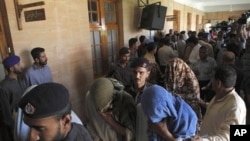Two senior officials in Pakistan's Sindh province, the police inspector general and the head of the paramilitary Rangers force, have been removed from their posts in response to the videotaped killing of an unarmed man in a park in the city of Karachi.
Pakistan's Supreme Court had demanded the removal of Sindh's two top security officials after a video was released showing paramilitary soldiers shooting 22-year old Sarfaraz Shah on June 8.
What video showed
The video originally aired uncut on Pakistani TV showing an unarmed Shah being shot and falling down in the street bleeding to death and screaming. He eventually died during treatment at a Karachi hospital.
The video disturbed many in Pakistan because of its brutal nature and also called into question the actions of the paramilitary force.
Public outcry
Sindh's chief minister, Qaim Ali Shah, spoke Tuesday in reaction to the public outcry.
A free, fair and impartial investigation is under way, he said. The decision to remove the top Ranger and police officials has been taken to make sure that neither officers or politicians can influence the probe.
The incident comes as criticism over the security forces continues to grow in Pakistan.
Most recently, the May 2 U.S. raid that killed Osama bin Laden in the Pakistani city of Abbottabad infuriated some Pakistanis who believed the country's security forces may have secretly aided the program.
Additional video
There is also another video circulating in Pakistan which shows the shooting deaths of five Russian nationals near the southwestern City of Quetta. Security forces claim they were suicide bombers, though there was no indication the would-be suicide bombers were armed.
Although the prevalence of camera phones and social media websites are raising the profile of these types of videos, political analyst Hassan Askari says there are those who may be using them for their own political gain.
Free media is playing an important role, he says. However, this would not have made such a major noise if the major political forces had not jumped in. So you have to combine the two. But since the political parties are active and they have a very clear agenda to somehow subdue the military, therefore the things are being kept alive.
Askari and others point out that it is not just the military’s conduct that is under attack but also the widespread belief that the armed forces’ relationship with the U.S. - while strained - is what is driving Pakistan’s foreign policy.
Pakistani Security Officials Removed Over Videotaped Killing




